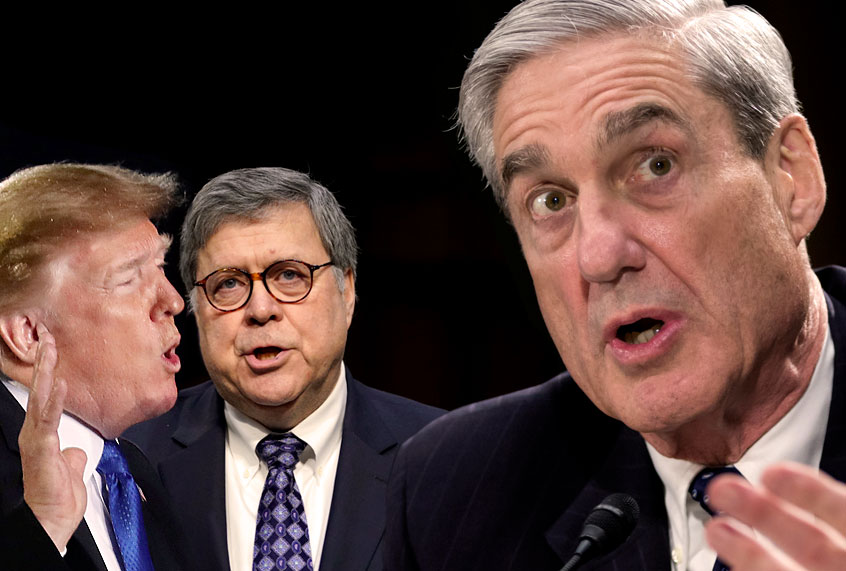Attorney General William Barr will release a redacted version of special counsel Robert Mueller’s report of his nearly two-year investigation into President Donald Trump’s 2016 campaign and foreign election interference Thursday morning, a Justice Department spokeswoman confirmed.
The report will be released to both Congress and the public, the spokeswoman, Kerri Kupec, said. Thursday’s release will mark the first step in what promises to be a lengthy battle with Democratic lawmakers over how much of the report they are allowed to see.
Barr will send the report after lawyers from the Justice Department and the office of the special counsel finish redacting portions of the roughly 400-page document. Barr, appearing before a congressional panel last week, identified four areas of information that would be redacted: grand jury information, information that would reveal intelligence sources and methods, information that could interfere with ongoing prosecution and information that implicates the privacy of “peripheral players.”
Barr said in a letter to lawmakers last month that the report “sets forth the special counsel’s findings, his analysis and the reasons for his conclusions” in Mueller’s investigation into possible collusion between the Trump campaign and Russia and whether Trump had illegally obstructed the inquiry. “Everyone will soon be able to read it on their own,” Barr said of the report.
Mueller announced the completion of his investigation into the president’s campaign and foreign election interference late last month. Barr set off a political firestorm after he released a four-page summary of Mueller’s report to Congress, in which he indicated the special counsel had not found evidence of criminal collusion or conspiracy between Trump’s presidential campaign and Russia during the 2016 election cycle. Barr noted in his summary that while Mueller’s report “does not conclude that the president committed a crime, it also does not exonerate him.” Trump has lauded Barr’s review, claiming it to be a “total and complete exoneration.”
Democrats, meanwhile, have dismissed Barr’s summary of Mueller’s report, arguing it is both incomplete and insufficient. They have zeroed in on Mueller’s decision to punt on whether Trump had obstructed justice, which Barr said “leaves it to the attorney general to determine.” Barr said he and Deputy Attorney General Rod Rosenstein concluded Mueller’s findings were “not sufficient to establish that the president had committed an obstruction-of-justice offense,” which Democrats say warrants further examination and the release of the full report. Even some prosecutors who worked for Mueller have said Barr did not accurately represent their findings after he received the report and shared its main conclusions.
Barr is not required by the regulations governing the special counsel to share the report with the public or notify Congress of more than “brief notifications, with an outline of the actions and the reasons for them.” His four-page overview of Mueller’s report dealt a blow to Democrats, who had hoped the special counsel’s account of his wide-ranging probe into the president’s campaign and election meddling would bolster their wide-ranging investigations into Trump and his business dealings.
House Speaker Nancy Pelosi, D-Calif., called Barr’s review of Mueller’s report “condescending” and demanded the attorney general release the special counsel’s full report.
“I have said, and I’ll say again, ‘No thank you, Mr. Attorney General. We do not need your interpretation. Show us the report and we can draw our own conclusions. We don’t need you interpreting for us,'” Pelosi said at a recent news conference. “It was condescending, it was arrogant and it wasn’t the right thing to do. The sooner they can give us the information, the sooner we can all make a judgment about it.”
The House Judiciary Committee voted earlier this month to authorize a subpoena for Mueller’s full report and evidence, depending on what Barr turns over. Chairman Jerry Nadler, D-N.Y., has threatened to subpoena the Justice Department to release Mueller’s report and related documents, if he and Barr cannot come to an agreement over redactions and the special counsel’s underlying evidence.
“As I have made clear, Congress requires the full and complete special counsel report, without redactions, as well as access to the underlying evidence,” Nadler said in a statement this month.
Barr has said he will make himself available to testify before the Senate and House Judiciary Committees next month after the report is released. He is scheduled to appear before the House and Senate Judiciary panels on May 1 and May 2 for hearings about Mueller’s investigation and report
Rep. Doug Collins of Georgia, the top Republican on the House Judiciary Committee, also asked that the committee invite Mueller to Capitol Hill to testify.
“If you seek both transparency and for the American public to learn the full contours of the special counsel’s investigation, public testimony from special counsel Mueller himself is undoubtedly the best way to accomplish this goal,” Collins wrote in a letter to Nadler.

